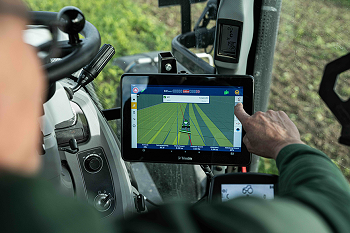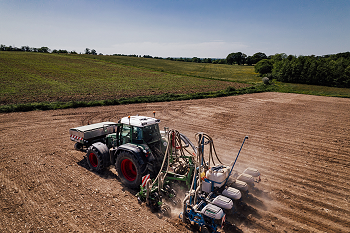From Spain, PTx Trimble manages key functions for the Mediterranean region in the areas of marketing, dealer development, and technical and commercial support.
PTx is the technology division of Agco – a multinational company that specialises in designing, manufacturing and distributing agricultural machinery and precision farming technology. Its portfolio provides compatible, powerful and simple solutions that help farmers connect machinery made by almost any brand, maximise their resources and make decisions with confidence.
PTx technologies are offered through two brands, Precision Planting and PTx Trimble, and in three different ways: through machinery distributors, as well as specialised and differentiated distributors of precision farming retrofits, OEM factory equipment and Agco-branded factory machinery.
At a time when the industry is in the midst of a transformation to address challenges like digitalisation, environmental impact, water resources and attracting young talent, new automation and smart data management technologies can help ensure the sustainability and competitiveness of the Spanish agricultural industry.


What has PTx Trimble’s trajectory been like in Spain?
Trimble was founded in 1978 in the United States, and began offering precision farming solutions in Spain over 20 years ago, in 2003. Subsequently, in 2023, PTx was formed as a joint venture between Agco and Trimble and continues to offer PTx Trimble solutions globally. Our commitment to developing Spanish agriculture leads us to work together with farmers and distributors to promote the adoption of precision technologies that improve the profitability and sustainability of farms with high added value. Through brands like Precision Planting and PTx Trimble, we offer solutions adapted to the needs of the Spanish agricultural industry, supporting the modernisation of the countryside and helping to meet the challenges of digitisation, resource efficiency and competitiveness demanded by today’s agriculture with a satisfactory response from the industry.
What are the challenges facing agriculture in Spain?
In Spain, the primary sector is also facing all the challenges I mentioned earlier, particularly those relating to efficient management of water resources and lack of generational replacement. In the short term, modernisation of the industry, through digitisation and sustainability, will remain crucial to improving competitiveness. Innovation ecosystems consisting of research-developers, public authorities and agri-food companies will play an important role in enabling economies of scale and enhancing the value chain. Spain has an important advantage here that it should be able to exploit.
How does technology support farmers? Can it drive a wedge between small and large farms?
The incorporation of technology into the agricultural industry does not have to accentuate the differences between large and small farms. On the contrary, it can act as a factor in democratising access to innovation. At PTx Trimble, we develop scalable and modular technological solutions that allow them to be adopted gradually, depending on the needs and capacities of each type of operation. Through retrofit systems, compatible with existing machinery, and a network of specialised dealers, we provide access to advanced technologies (such as autoguidance equipment, section control, water management and data-driven agronomic management) without the need for large upfront investments. In a context like the Spanish one, where a significant proportion of farms are family-run or medium-sized, it is essential that technology is designed according to criteria of accessibility, interoperability and a clear return on investment. At PTx Trimble, we understand that promoting the digitisation of the countryside must be accompanied by proposals adapted to the local productive reality.
What have been PTx Trimble’s most important investments in Spain?
Following the PTx Trimble working model, investments have been made in Spain in training and equipping the distribution network that specialises in precision agriculture, in order to be able to provide local service. Based on this, PTx Trimble’s full line distributors have over 20 permanent employees and specialised technicians working at the service and repair centre, facilitating professional, effective and extremely fast support for their equipment in Spain.
How many employees do you have in Spain?
The PTx Trimble team in Spain currently consists of six full-time employees, all in positions of responsibility and leadership in the region. These include the PTx Marketing Manager for EMEA, the Sales Manager for the Mediterranean region, the Sales Manager for Iberia, the Sales Manager for Italy, Greece and Israel, an Aftermarket Engineer specialising in the Mediterranean region and a Field Focus Manager for Iberia focusing on Agco dealers for its three brands (Fendt, Massey Ferguson and Valtra). This team not only operates locally, but also has regional reach, positioning Spain as a strategic operational platform within the European strategy. Although the current number of employees is small, the growth plan envisages gradual growth depending on the expansion of the distribution networks, the deployment of new products and the development of technological initiatives adapted to the Spanish agronomic reality. The incorporation of local technical and agronomic professionals will continue to be key to ensure proximity to the market.
How important is Spain for the company’s strategy?
Spain represents a priority market and a key operational platform for PTx Trimble within the region, both in terms of its productive diversity and the structural challenges faced by the agricultural industry. For over 15 years, we have been supporting Spanish farmers with different types of crops, including horticultural crops, extensive crops (such as the full range of cereals, sugar beet, maize and sunflower) and woody crops, such as olive groves, which are a historical point of reference for the region. In recent years, we have also seen a growing demand for technological solutions applied to new high-value crops, such as almonds and pistachioes, which confirms the evolution of the Spanish production model towards more intensive, technology-assisted and export-oriented systems. Spain also plays a fundamental role in the area of food safety in the European Union, being one of the main producers of foodstuffs in terms of both volume and quality. This positioning reinforces the need to adopt precision technologies to optimise resources, guarantee traceability and respond to the sustainability requirements of the new CAP and the European Green Pact. In this respect, our solutions respond directly to priority challenges, such as water efficiency, digitisation of the countryside and the need for adaptable technologies that add value, from family farms to large agro-industrial operations. For all these reasons, Spain is not only a strategic market in commercial terms, but also an ideal environment for developing, validating and scaling up agricultural technologies that can be applied to the whole of southern Europe. From here, we also manage key functions for the Mediterranean region in the areas of marketing, dealer development, technical and commercial support.
What is your customer profile in Spain?
By production type, we work with farmers of extensive cereal and oilseed crops – especially in Castile and León, Castile–La Mancha and Aragon; with intensive fruit-and-vegetable producers in Andalusia, Murcia and the Valencian Community, achieving high productivity per hectare; with olive growers, especially high-density (hedgerow) groves with advanced technology; and with irrigated farming using precision irrigation systems. Because of their structure, we work with medium and large farms in the process of concentration and growth; with agricultural cooperatives seeking shared machinery and technology services; and with export-oriented farmers who require high standards of quality and traceability.
What are your next challenges?
It is clear to us that the next challenges are linked to current challenges in the industry, such as climate change, market volatility and the need for generational change. The ageing of the rural population, with an average age of 57 in the EU, also raises doubts about the future of family farming; the need to integrate sustainable practices and move towards energy efficiency; and the failure to adopt advanced technologies, something which limits the industry’s capacity to face new challenges.
Photos: PTx Trimble



